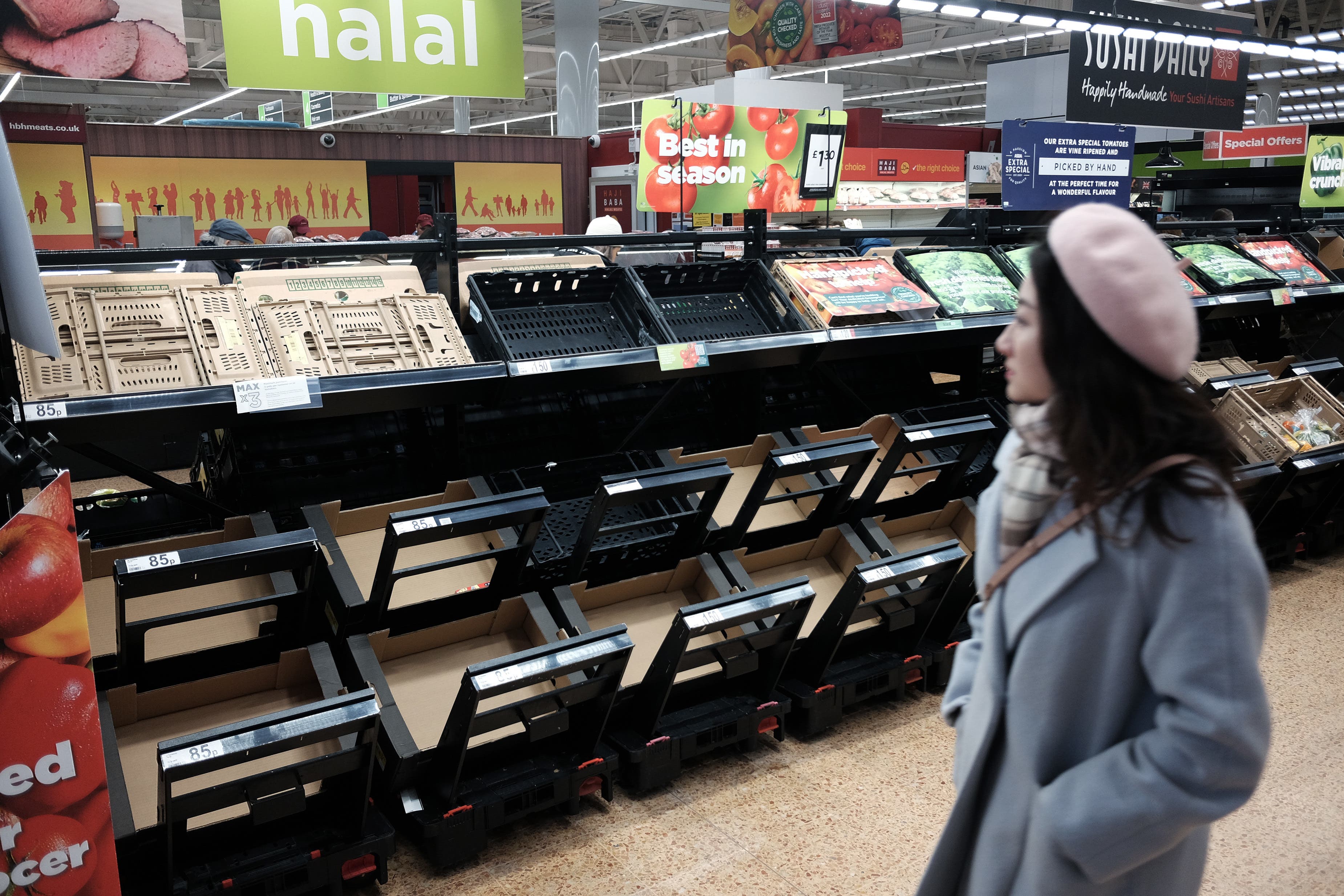Coming soon to a supermarket near you… another Brexit dividend!
From next week, all fruit, veg, meat and dairy arriving from the EU will have to undergo paperwork checks, which will hinder deliveries and drive up costs. It’s a recipe for disaster, says Femi Oluwole – so little wonder the Conservatives have tried putting off the phasing-in of Brexit border controls


Bad news for anyone who believed the Conservatives had got Brexit done.
At the end of the month – in just nine days’ time, in fact – a brand new phase comes into effect. It will surprise next to no one that the UK is unprepared for it, or the impact it will have on our lives.
From 31 January, four years to the day after we left the European Union, imports of fresh food, plant and animal products from the EU will require health certification, for the first time in decades.
The UK imports nearly half of its fresh vegetables and the majority of its fruit, both mainly from the EU. The Tories have so far delayed the start of these import checks five times for the inevitable impact they will have on livelihoods. They know it will hinder deliveries and drive up prices – and during a cost of living crisis.
If the need for everything from French wine and Irish beef to Belgian potatoes and even Dutch daffodil bulbs arriving in the UK to have the correct paperwork isn’t unwelcome enough – and it is estimated the new checks will cost businesses some £330m to administer – we can expect a further ratcheting-up of red tape in April, when physical inspections of imported goods at the UK border will begin.
Things are already more than bad enough. The new border checks on fresh fruit and veg couldn’t have come at a worse time for the nation’s failing health. In the two years since Rishi Sunak became prime minister, tens of thousands in the UK have been diagnosed with Dickensian diseases such as rickets and scurvy, both of which are linked to malnutrition.
Last month, international children’s charity Unicef said the UK has the worst child poverty among rich countries. Industry bodies such as the Fresh Produce Consortium, the British Retail Consortium and the Food and Drink Federation have all said that new checks will add costs and delays to UK food supplies. So how do you think that will affect those kids?
The government has tried to downplay the impact these new Brexit import checks will have. Last August, it said they would only add 0.2 per cent to prices over three years. But its own words and figures are enough to make you doubt that claim.
For starters, the August report itself said: “Costs will depend greatly on how businesses adapt their business models.” This reminds me of Jacob Rees-Mogg saying: “Some businesses, that for other reasons have not been doing well, like to blame Brexit. But that’s actually an excuse of poor management.” So the Tories will be knowingly making life harder for the people who work in our economy – and when we suffer from their actions, they will blame us for not coping well enough.
I say “knowingly” because back when Rees-Mogg was trying to take credit for delaying Brexit checks, he said they would cause an up to “71 per cent increase, maximum level, on the retail price” of food.
Furthermore, in their report, they defended the introduction of checks on EU products because “controls have already been implemented by the EU on UK goods”. But that has been devastating for UK exporters. In October 2022, one in five small businesses reported that they were simply no longer able to sell to the EU because of the extra paperwork. And the British Chamber of Commerce says it’s only getting more expensive to do so.
And if you’re thinking checks on imports won’t be as damaging as checks on exports, why? The Brexiters have spent the last eight years telling us that EU countries need us more than we need them because we import more from them than we export to them.
And you remember how they said we didn’t need the EU because we could just shift our trade to other continents? Well, ONS data published by research organisation UK in a Changing Europe shows that we’ve actually leant more towards EU trade compared to the rest of the world. Trade with our nearest market is now greater than it was at the time of the 2016 referendum.
So we’re now even more dependent on the trade links that the Tories are set to damage further in nine days’ time.
And as the Bank of England’s Catherine Mann explained, the extra cost won’t just add to inflation directly. Many smaller EU firms haven’t been able to sell to the UK because of the extra friction Brexit has already created. That means fewer companies competing with each other on price to sell to us, and therefore higher prices for us.
With days to go, the Tories could delay these import checks for a sixth time. They could argue, in an election year, and with the cost of living crisis biting as hard as it is, that it is the right thing to do.
The tragedy is that campaigners spent three years trying to stop Brexit because we didn’t want people to be hurt at all. Boris Johnson, the prime minister of the day, accused us of “dither and delay” for refusing to implement the “will of the people”.
I remember when Rishi Sunak promised us that getting Brexit done would mean an “immediate £20bn” extra for the UK. That would be an extra £300 a year for every child, woman and man in the country.
Instead, the Tories are going into this general election year having repeatedly refused to do the one thing they were elected on last time: Get Brexit Done.
But they’ve finally run out of road – and are about to make voters pay an even higher price for it.
Femi Oluwole is a passionate campaigner against Brexit and a co-founder of pro-European Union advocacy group Our Future Our Choice






Join our commenting forum
Join thought-provoking conversations, follow other Independent readers and see their replies
Comments